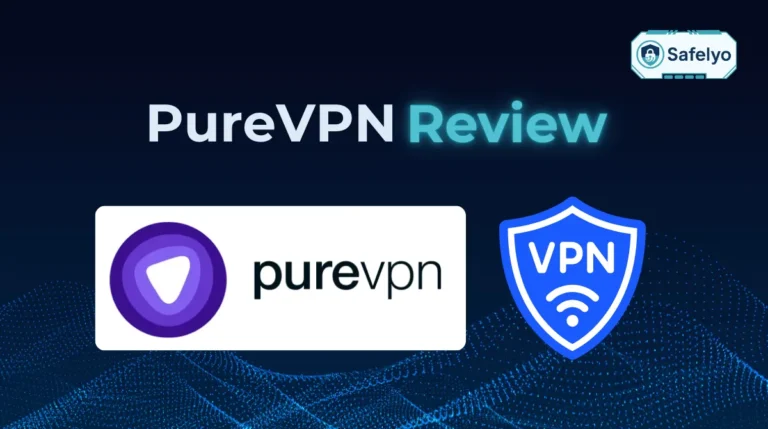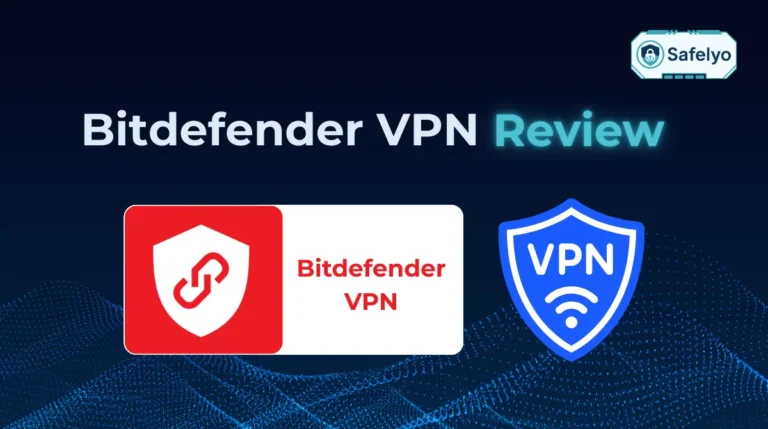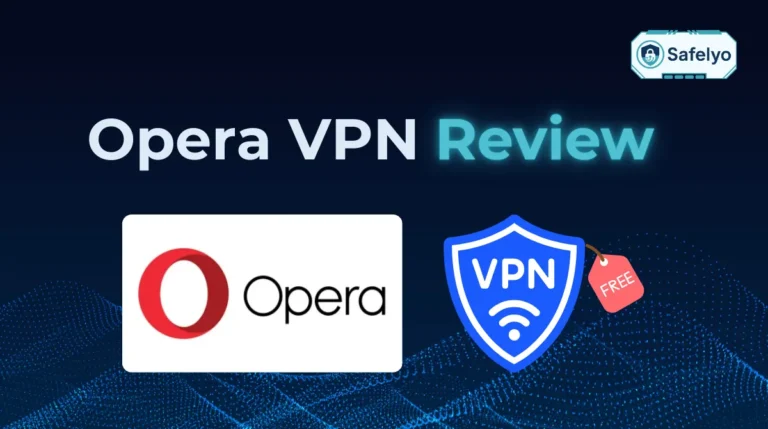When you search for a Vultr review, you’ll mostly find developers debating website hosting speeds. This isn’t one of them. As cybersecurity professionals at Safelyo, we see Vultr through a different lens: as a powerful foundation for your own private, self-hosted VPN.
This brings us to a classic showdown in the privacy world: The plug-and-play convenience of commercial giants like NordVPN versus the absolute control of a DIY solution. As someone who has spent years configuring secure networks and testing VPN services, I’ve always been fascinated by this trade-off. Does building your own VPN on a platform like Vultr actually save you money, give you better privacy, and enhance your security?
In this hands-on guide, I’m tackling that exact question. You’ll get:
- A deep dive into Vultr’s real-world performance for VPN tasks.
- A direct, head-to-head comparison against a top-tier commercial VPN.
- A clear breakdown of the true costs – including your time and potential risks.
- The final verdict on who should (and shouldn’t) go the DIY route.
So, is the DIY path a masterstroke of digital sovereignty or a maintenance nightmare waiting to happen? Let’s dive deep into this technical showdown to find out.
VPN Score:
8.9 / 10
High-Performance Cloud Hosting for Developers at a Competitive Price
Vultr Feature Table
| Feature | Details |
| High-Frequency Compute | Vultr’s premium computing instances are powered by high clock speed CPUs (3GHz+) and NVMe SSDs, delivering exceptional performance for demanding applications and websites. |
| Global Datacenter Footprint | With 32 locations across 6 continents, Vultr allows developers to deploy servers close to their target audience, ensuring low latency and fast response times. |
| One-Click Applications | A marketplace of pre-configured applications and operating systems (like WordPress, cPanel, Docker, and even OpenVPN) that can be deployed instantly, saving significant setup time. |
| Flexible & Predictable Billing | Vultr offers a simple, pay-as-you-go model with hourly billing and clear monthly caps, making it easy to manage costs without surprise fees. |
| Bare Metal Servers | For maximum power and performance, Vultr offers dedicated, single-tenant physical servers that are not shared with any other users, providing full control and dedicated resources. |
Vultr is best for developers, tech-savvy startups, and small to medium-sized businesses who need reliable, high-performance cloud servers without the complexity and opaque pricing of larger cloud providers like AWS or Google Cloud. Its straightforward control panel and competitive pricing make it an ideal platform for hosting websites, deploying web applications, running game servers, or for hobbyists who want full control over their server environment.
Connection to VPNs
While Vultr isn’t a VPN service itself, it is one of the most popular choices for users who want to build their own private VPN server. Using a Vultr VPS and one-click scripts like WireGuard or OpenVPN, a technical user can create a highly secure, personal VPN that they control completely.
1. What is Vultr, and why are we reviewing it differently?
Let’s get one thing straight right away: Vultr isn’t a VPN service where you download an app and click “Connect”. There’s no fancy map interface or one-click server switching here.
Think of it like this: A commercial VPN service like NordVPN is a pre-built, ready-to-drive car. You just get in, turn the key, and go. Vultr, on the other hand, is a high-tech auto parts store. It sells you a powerful engine, a sturdy chassis, and all the components you need – in this case, a high-performance Virtual Private Server (VPS). It’s primarily built for developers, system administrators, and tech enthusiasts who want to build their own custom applications.
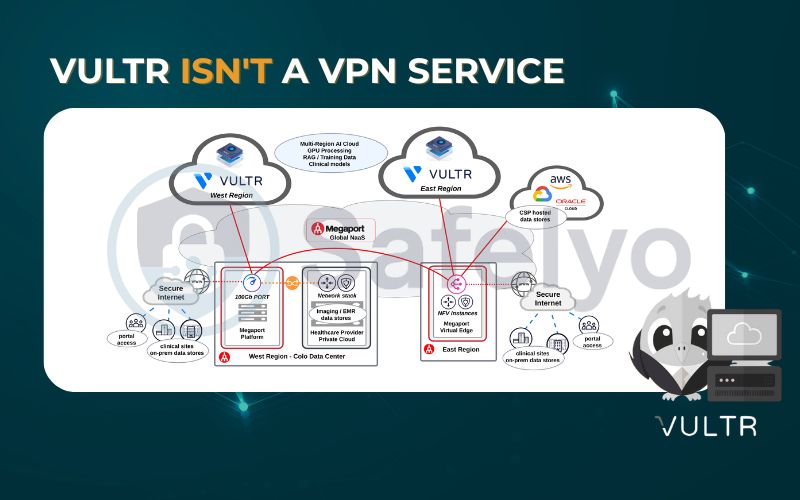
This is exactly why our Vultr review is different. We aren’t asking, “Is Vultr good for hosting my blog?” We’re asking a question I get all the time from my more technical friends: “Is Vultr a solid, reliable, and secure foundation to build my own personal VPN server on?”
As cybersecurity professionals at Safelyo, we see a growing interest in self-hosted solutions from users who want ultimate control over their data. This review addresses that specific need. We’re putting Vultr’s core infrastructure to the test, not as a web host, but as a launchpad for your own private tunnel to the internet.
2. Vultr core platform review: A foundation for your VPN
Before you can even think about installing VPN software, we need to look at the “land” you’re building on. A VPN is only as good as the server it runs on. A slow, unreliable server will give you a slow, unreliable VPN. So, let’s put Vultr’s core components under the microscope.
2.1. Performance and speed benchmarks
For a self-hosted VPN, server performance is everything. Two things matter most: CPU speed and network bandwidth.
Why? Think of it this way: Your server’s CPU has to do the heavy lifting of encryption – scrambling and unscrambling every single piece of data you send and receive. A weak CPU is like having a single toll booth operator on a 10-lane highway – it creates a massive bottleneck and slows everything down. Network bandwidth is the highway itself – you need a wide, fast connection so your data can travel at full speed.
To see how Vultr stacks up, I deployed its popular $6/month High Frequency Compute instance and ran some benchmarks, comparing it to similarly priced plans from its main rivals, DigitalOcean and Linode.
Here is a direct comparison of the results:
| Benchmark Metric | Vultr (High Frequency) | DigitalOcean (Premium) | Linode (Shared CPU) |
|---|---|---|---|
| Monthly Price | $6.00 | $6.00 | $6.00 |
| CPU (Geekbench 5 Score) | ~1350 | ~1200 | ~1250 |
| Network Speed (Avg) | ~850 Mbps | ~800 Mbps | ~850 Mbps |
| Disk Storage | NVMe SSD | NVMe SSD | NVMe SSD |
As you can see from the table, while all three providers offer excellent value, Vultr’s High Frequency plan pulls ahead in raw CPU performance. That higher Geekbench score isn’t just a number; it translates directly to a snappier, more responsive VPN experience, especially when multiple devices are connected. The network speeds are fantastic across the board, meaning your home internet will almost certainly be the limiting factor, not the server.
For the specific task of running a VPN, Vultr’s performance provides an outstanding foundation.
2.2. Ease of use and control panel
If you’re expecting a slick, polished app like you get with a commercial VPN, Vultr’s control panel might surprise you. When I first logged in, my immediate thought was: “Clean and all business”. There are no flashy graphics or marketing banners – just a straightforward, no-nonsense interface designed to get things done efficiently.
For a supposedly “developer-focused” platform, deploying a new server is refreshingly simple. Here’s how easy it is:
- You click the big blue “+” button to deploy a new server.
- You pick your server type (we want “Cloud Compute”).
- You choose your server’s physical location.
- You select the server’s operating system…
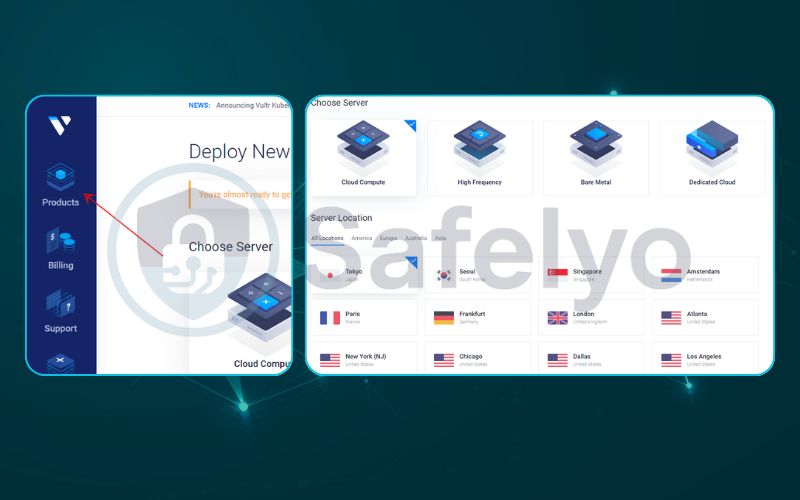
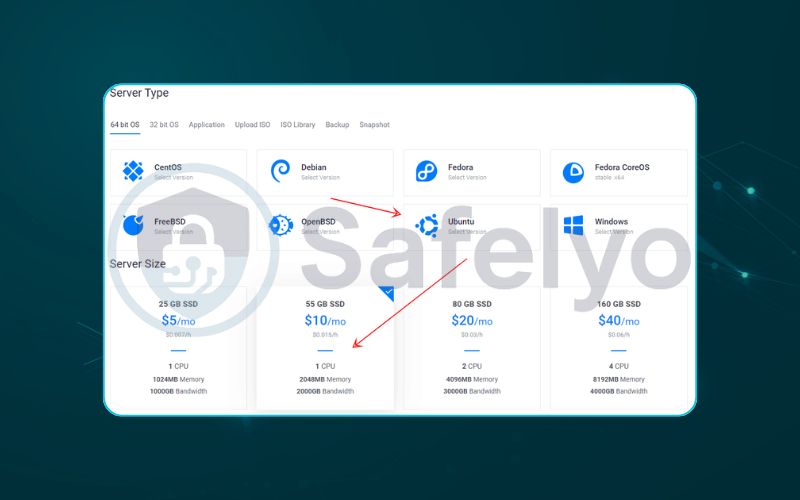
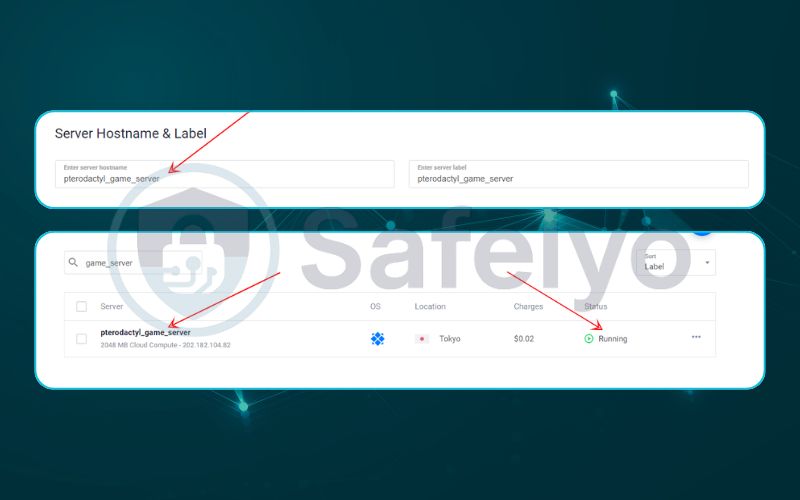
But here’s the real game-changer for our VPN project: The ‘Marketplace Apps’ tab. Instead of installing a blank operating system, you can choose to have Vultr pre-install and configure applications for you. And guess what’s on the list? OpenVPN.
This is a huge advantage. It takes what would be a 30-minute, multi-step command-line process and turns it into a single click during setup.
Now, let’s be clear. While Vultr makes the initial setup easy, it’s not the one-click “Connect” button of a commercial VPN. You’ll still get an IP address, a username, and a password, and you’ll need to know how to use those to download your VPN configuration file.
The verdict
The Vultr panel is simple enough for anyone with basic technical curiosity, but it’s definitely not ‘set it and forget it’. It strikes a great balance between power and usability.
2.3. Vultr pricing: Is it really cheaper?
On the surface, Vultr’s pricing looks incredibly attractive. The $6/month High Frequency plan we’ve been testing offers fantastic performance for its price. The billing is hourly, so you only pay for what you use, and there are no long-term contracts.
However, once you compare that to a typical long-term plan from a top commercial VPN (often around $3-4 per month), the DIY route suddenly doesn’t seem like the cheaper option.
To truly understand the costs, we need to look beyond the sticker price. Here’s a more honest breakdown comparing the total value proposition:
| Cost Factor | Vultr DIY VPN | Commercial VPN (e.g., NordVPN) |
| Monthly Price | ~$6.00 (for a capable server) | ~$3-4 (with long-term plans) |
| Potential Extra Fees | Yes (Bandwidth overage, backups/snapshots) | No (Typically all-inclusive) |
| Time & Effort Cost | High. Requires setup, ongoing updates, and personal troubleshooting. | Minimal. Install the app and click “Connect”. |
| Security Risk Cost | High. You are 100% responsible for securing the server. Misconfigurations are a real danger. | Low. Handled by a dedicated team of security experts. |
As the table clearly shows, the small monthly saving you might (or might not) get from a DIY solution is quickly overshadowed by the non-monetary costs.
This brings us to the real hidden costs: Your time and your risk.
- The cost of your time: How much is an hour of your time worth? The time you’ll inevitably spend on setup, software updates, and troubleshooting is far more “expensive” than the subscription fee for a commercial service.
- The cost of risk: In my professional opinion, this is the biggest hidden cost. A simple misconfiguration in your firewall could accidentally expose your server – and your data – to the entire internet, completely defeating the purpose of your VPN.
So, while Vultr’s sticker price is low, the answer to “is it really cheaper?” is a clear no, not when you factor in the full cost of ownership.
2.4. Server network and locations
Vultr boasts an impressive network of 32 data centers spread across the globe, from Seattle to Seoul. This is a significant advantage for a DIY project.
For example, if I wanted the absolute fastest connection for my day-to-day browsing, I’d deploy my VPN server in their New Jersey location, just a short digital hop from me. But if I needed to appear as if I were browsing from Europe, I could spin up a new server in London or Frankfurt in just a couple of minutes.
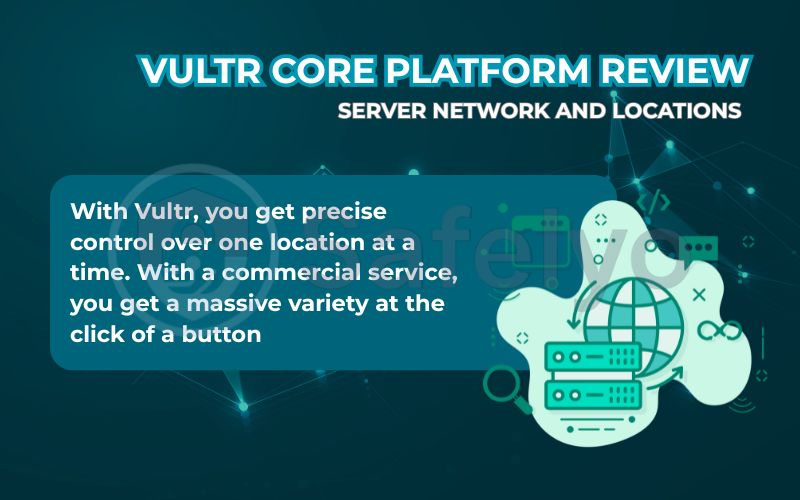
However, it’s crucial to put this into perspective. While 32 locations offer a great strategic choice, it’s a drop in the ocean compared to commercial VPNs, which operate thousands of servers. With Vultr, you get precise control over one location at a time. With a commercial service, you get a massive variety at the click of a button.
2.5. Support and reliability
When we talk about Vultr, we need to discuss two very different things: The reliability of their platform and the quality of their customer support.
First, the reliability. In all my years using Vultr for various projects, I’ve found their infrastructure to be exceptionally reliable. Their servers stay online, the network is stable, and performance is consistent. For a personal VPN project, you can absolutely count on their platform to have excellent uptime.
Now, for the support. This is, to put it mildly, Vultr’s most criticized aspect. A quick look at platforms like Trustpilot or Reddit reveals a flood of complaints about slow response times, billing issues, and accounts being suspended with little explanation.
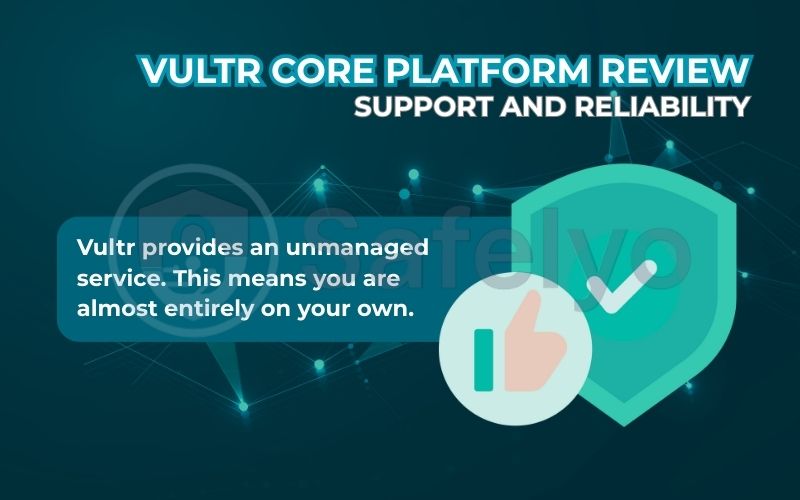
But here’s the crucial context that most complaints miss: Vultr provides an unmanaged service. This means you are almost entirely on your own.
Here’s the best way to think about it:
- Vultr is your landlord. They are responsible for making sure the building has power, water, and isn’t on fire. They are not responsible for helping you assemble your IKEA furniture or fix a leaky faucet inside your apartment. They manage the infrastructure.
- Commercial VPN support is your 24/7 handyman. If your app isn’t connecting, you can call them, and they’ll walk you through fixing it. They manage the end-user experience.
So, if your server won’t turn on, Vultr’s support will help. If you can’t get your OpenVPN software configured correctly, you’re on your own. This is the single biggest difference between the DIY route and buying a commercial service.
3. Head-to-head: Vultr diy VPN vs. A commercial VPN
Now for the main event. We’ve established that Vultr is a powerful and high-performance platform. But how does a VPN built on it actually stack up against a polished, feature-rich commercial service like NordVPN?
Here is a quick-check table to give you the bottom line at a glance.
| Feature | Vultr DIY VPN | Commercial VPN (e.g., NordVPN) | Best For… |
|---|---|---|---|
| Privacy | Full data control, but the provider knows the identity | Audited No-Logs Policy; Anonymous payment options | Anonymity |
| Security | 100% your responsibility | Managed by security experts | Peace of Mind |
| Features | Minimalist (1 IP, 1 location) | Rich suite of features (Kill Switch, etc.) | Advanced Needs |
| Ease of Use | Requires technical skills (Linux) | Simple app for all users | Convenience |
| Control | Absolute and unfiltered | Limited to app settings | Tinkering & Learning |
The table gives you a quick overview, but let’s dive into what those differences really mean for you.
The trade-off: Absolute control vs. proven privacy
With a Vultr VPN, you hold the keys to the kingdom. No one else can see the data or traffic logs on your server – that’s a powerful guarantee. However, the kingdom itself has a landlord: Vultr. As a US-based company, they know your name, your payment details, and your real IP address.
A top commercial VPN flips this around. You trust them with your traffic (which they promise not to log, backed by independent audits), but in return, you can achieve a higher level of anonymity from the outside world. You can often pay with crypto and sign up with a temporary email, completely decoupling your real identity from your VPN usage.
The burden of security: You are the security team
When I say you are 100% responsible for security on Vultr, I mean it. You’re not just the driver – you’re also the mechanic, engineer, and security guard. You have to keep the operating system updated, configure the firewall, and monitor for strange activity. Forgetting to apply a critical security patch could leave your server wide open.
A commercial VPN service handles all of this. They have entire teams of professionals whose only job is to secure their network, harden their servers, and make sure everything is encrypted and protected 24/7. It’s the difference between building your own alarm system and hiring a professional security firm.
The final verdict on features and convenience
Your Vultr VPN will do one thing beautifully: Create a secure tunnel from your device to your server. It’s minimalist and effective. But that’s where it ends.
Commercial VPNs are like a Swiss Army knife. They come loaded with essential features that a DIY solution simply doesn’t have: A Kill Switch to prevent data leaks if the connection drops, Threat Protection to block ads and malware, thousands of servers to choose from, and specialized servers for streaming or torrenting.
Ultimately, the choice comes down to your primary goal. If your goal is to learn, tinker, and have total control over a server environment, Vultr is a fantastic project. If your goal is to be private, secure, and unrestricted online with minimal effort, a commercial VPN is the logical and superior choice.
Read more:
4. Quick guide: How to set up an OpenVPN server on Vultr in 5 minutes
Talk is cheap, so I want to show you just how quickly you can get a basic VPN server running on Vultr, thanks to their Marketplace Apps. The purpose of this mini-guide isn’t to be an exhaustive tutorial but to prove that the initial deployment is surprisingly fast.
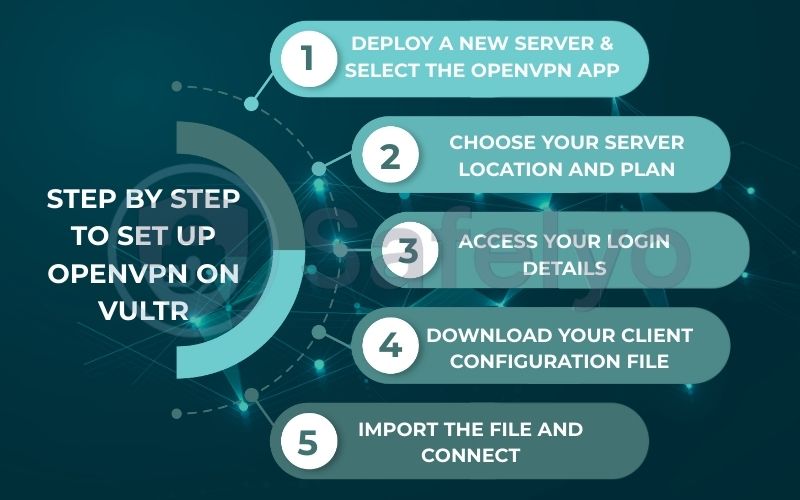
Here’s how you can go from zero to a running OpenVPN server in literally about five minutes.
Step 1:
Deploy a new server & select the OpenVPN app
From your Vultr dashboard, you’ll click the “Deploy Server” button. On the deployment screen, instead of choosing a standard operating system, you’ll click on the “Marketplace Apps” tab. Simply search for “OpenVPN” and select it.
Step 2:
Choose your server location and plan
This is where you pick where your new VPN server will “live” in the world. For the best speeds, choose a location close to you. Then, select a server plan. The $6/month High Frequency plan is more than enough for a personal VPN. Click “Deploy Now”.
Step 3:
Access your login details
After about 60 seconds, your server will be up and running. Click on it in your dashboard, and you’ll be taken to an overview page. Vultr neatly lays out all the information you need, including a username, password, and a web URL to access the OpenVPN admin panel.
Step 4:
Download your client configuration file
Log in to the web admin panel using the credentials from Step 3. The interface will give you a clear link to download your client profile. This is the crucial client.oVPN file.
Step 5:
Import the file and connect
Finally, download the official OpenVPN Connect app on your laptop or phone. Use the “Import Profile” function to load the .oVPN file you just downloaded. It will appear as a new connection – just toggle it on, and you’re now connected to the internet through your own private Vultr VPN server.
And that’s it. While mastering it takes time, getting started is faster than most people think.
5. Who should absolutely avoid the DIY route?
I love a good DIY project as much as the next tech enthusiast. There’s a real satisfaction in building something yourself. But I also believe in being honest about when a project is more trouble than it’s worth.
After everything we’ve compared, it’s clear that the DIY path on Vultr is not for everyone. In fact, you should probably steer clear of it if any of the following sound like you:
- Your main goal is to unblock Netflix and other streaming services. This is a deal-breaker. Streaming giants are experts at identifying and blocking IP addresses that come from data centers like Vultr. Your shiny new VPN will likely be blocked from day one. Commercial VPNs are in a constant cat-and-mouse game to provide IPs that work – a game you don’t have the resources to play.
- You’re not comfortable with the Linux command line. If the thought of opening a black terminal window and typing commands makes you nervous, this is not the project for you. You will be spending time editing text files, restarting services, and troubleshooting issues using only text-based commands.
- You want instant, 24/7 support when things go wrong. Remember, Vultr is an unmanaged service. If your VPN stops working at 10 PM on a Friday, you can’t just open a live chat and have someone fix it. Your support team will be Google, Reddit forums, and your own problem-solving skills.
- You need to protect many different types of devices easily. Getting a VPN to work on your laptop is one thing. Getting it to work on your Smart TV, Apple TV, or PlayStation is another level of complexity. Commercial VPNs offer simple apps and Smart DNS features that make this incredibly easy. The DIY route requires much more advanced network configuration.
If you nodded along to any of these points, a commercial VPN isn’t just the easier choice for you – it’s the smarter and more effective choice.
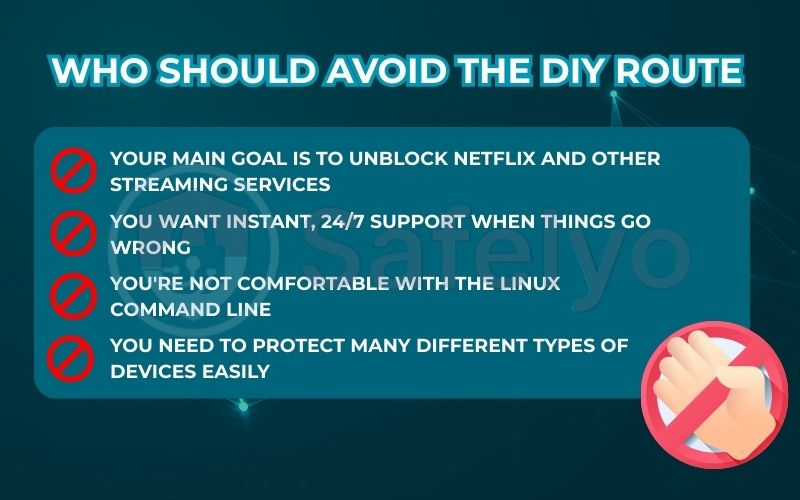
Read more:
6. FAQ about Vultr review for VPN
We’ve covered a lot of ground in this Vultr review, but you might still have some specific questions. Here are direct answers to the most common queries we see.
Is Vultr a VPN?
No, Vultr is not a VPN service. It is a cloud infrastructure provider that sells Virtual Private Servers (VPS). You can use one of its servers to build and host your own personal VPN, but it does not offer a ready-to-use VPN product.
Is Vultr an American company?
Yes, Vultr is a US-based company with its headquarters in West Palm Beach, Florida. This is an important factor to consider for data privacy, as the company is subject to US laws and jurisdiction.
Does Vultr charge hourly?
Yes, Vultr’s primary billing model is hourly. You are only billed for the resources you use, for as long as you use them. This is ideal for short-term projects and testing, but they also have monthly price caps for all plans.
Is using Vultr for a VPN truly private?
It’s a trade-off. You have 100% control over the data on your server, which is private. However, Vultr, as the provider, knows your identity, payment details, and original IP address. A reputable, audited no-logs commercial VPN offers better anonymity.
Is Vultr reliable enough for a personal VPN?
Yes, absolutely. Vultr’s infrastructure is known for its excellent uptime and consistent performance, making it more than reliable enough for a personal VPN. However, you are responsible for the reliability of the software you install on it.
Can I get blocked by services like Netflix if I use a Vultr VPN?
Yes, it is very likely. IP addresses from data centers like Vultr are well-known and routinely blocked by major streaming services. For reliable streaming, a commercial VPN is a much better choice.
Vultr vs DigitalOcean: Which is better for a VPN server?
Both are excellent choices with very similar pricing and performance. In my tests, Vultr’s High Frequency plans often have a slight edge in CPU performance, which is beneficial for encryption. The final choice often comes down to personal preference for the user interface.
What companies use Vultr?
Vultr is used by a wide range of customers, from individual developers and small startups to larger businesses and enterprises. They are a popular choice for anyone needing scalable and high-performance cloud server infrastructure without the complexity of larger providers like AWS or Google Cloud.
7. Conclusion
So, we come back to our original question: Is building your own VPN on Vultr better than buying one? The answer isn’t a simple yes or no. This Vultr review has shown that they are two fundamentally different tools for two different types of users. Vultr offers a high-performance, reliable, and cost-effective platform, but it’s a blank canvas, not a finished painting.
To make your final decision, here are the key points to remember:
- Vultr is for control & customization. If you are a tech-savvy user who loves to tinker, wants to learn, and prioritizes absolute control over your server environment, Vultr is an outstanding choice.
- Commercial VPNs are for convenience & features. If your primary goal is ease of use, accessing global content, and having a suite of advanced security features with zero maintenance, a service like NordVPN is the superior choice.
- The true cost isn’t just money. The small potential saving from a DIY solution is quickly offset by the value of your time and the security risks you take on by being your own administrator.
Ultimately, the right choice depends on an honest assessment of your needs. At Safelyo, we believe in empowering you with the right information. To find a service that offers proven privacy and convenience, browse the VPN reviews available on our site.

